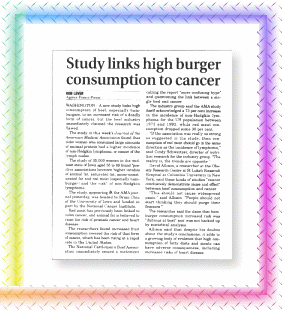| |
|
Study links high burger consumption to cancer
[WASHINGTON] A new study links high consumption of beef, especially hamburgers, to an increased risk of a deadly form of cancer, but the beef industry immediately claimed the research was flawed. The study in this week's Journal of the American Medical Association found that older women who consumed large amounts of animal protein had a higher incidence of non-Hodgkin lymphoma, or cancer of the lymph nodes. The study of 35,000 women in the midwest state of Iowa aged 55 to 89 found "positive associations between higher intakes of animal fat, saturated fat, mono-unsaturated fat and red meat [especially hamburger] and the risk" of non-Hodgkin lymphoma. The study, appearing in the AMA journal yesterday, was headed by Brian Chiu of the University of Iowa and funded in part by the National Cancer Institute. Red meat has previously been linked to colon cancer, and animal fat is believed to raise the risk of prostate cancer and heart disease. The researchers found increased fruit consumption lowered the risk of that form of cancer, which has been rising at a rapid rate in the United States. The National Cattlemen's Beef Association immediately issued a statement calling the report "more confusing hype" and questioning the link between a single food and cancer. The industry group said the AMA study itself acknowledged a 73 per cent increase in the incidence of non-Hodgkin lymphoma for the US population between 1973 and 1992, while red meat consumption dropped some 30 per cent. "If the association was really as strong as suggested in the study, then consumption of red meat should go in the same direction as the incidence of lymphoma," said Cindy Schweitzer. director of nutrition research for the industry group. "The reality is, the trends are opposite." David Allison, a researcher at the Obesity Research Centre at St Luke's Roosevelt Hospital at Columbia University in New York, said these kinds of studies "cannot conclusively demonstrate cause and effect" between beef consumption and cancer. "This should not cause widespread panic," said Allison. "People should not start thinking they should purge their freezers." The researcher said the claim that hamburger consumption increased risk was "dubious at best" and was not backed up by statistical analysis. Allison said that despite his doubts about the study's conclusions, it adds to a growing body of evidence that high consumption of fatty diets and meats can have adverse consequences, including increased risks of heart disease.
|
|---|
 Bangkok
Post ◆ May 2, 1996
Bangkok
Post ◆ May 2, 1996